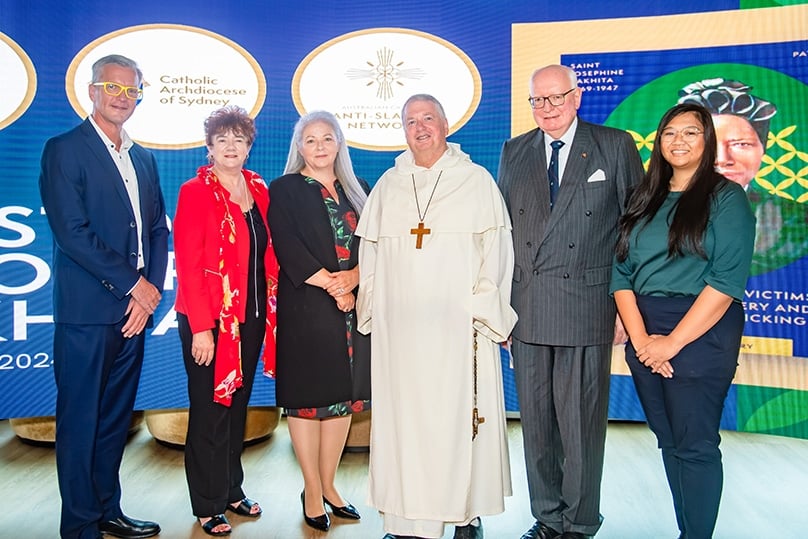
Executive leaders from Sydney Catholic Schools met to pray and honour the victims of modern-day slavery and human trafficking in reflective and hopeful service on the feast day of St Josephine Bakhita.
Archbishop Anthony Fisher OP presided over the prayer service which was also attended by the Sydney Archdiocesan Anti-Slavery Taskforce chair John McCarthy KC and coincided with the International Day of Prayer and Awareness Against Human Trafficking.
Around 41,000 people in Australia and 50 million worldwide live in situations of forced labour, human trafficking, forced marriage, domestic or other forms of servitude according to recent estimates.
The SCS commemoration on 8 February highlighted migrant workers at sea, a high-risk group when it comes to modern forms of slavery.
Sr Mary Leahy rsj addressed the gathering and shared stories from her decades of chaplain ministry to seafarers docking in Australian ports who often work in harsh conditions and are at risk of exploitation.
Sydney Catholic School staff donated a range of essential products and gifts including toothpaste, socks and chocolates, which Sr Mary said will make enough care packs to supply the crew of 10 ships.
She shared stories of the challenges they face such as the hardship of being far away from loved ones for extended periods, and in some cases unsafe working conditions and threats of violence.
She said the care packs will be a nice surprise for the recipients and help them to know that they are not being forgotten.
Moe Turaga, a consultant for the Australian Catholic Anti-Slavery Network, also shared his experience on the day of being exploited as a 17-year-old fruit-picker in Australia who, despite believing his wages were being forwarded to his mother, was never actually paid.
“This kind of betrayal is something that tests your faith in humanity,” he said.
“Despite millions of people living in modern slavery in the world, awareness remains a huge challenge.
“Since I began sharing my story, I have been contacted non-stop by many people, particularly migrant workers, with stories of abuse.
“I believe the current estimate of 41,000 people living in modern slavery in Australia is a conservative estimate, and the actual number is much higher.”
St Josephine Bakhita was born in Sudan in 1869, kidnapped at the age of nine and held as a slave in Sudan and Italy.
Later when she was freed, she forgave her captors, asked to be baptised and became a Canossian Sister. She was canonised in 2000.
Anti-Slavery Taskforce executive officer Alison Rahill said the feast day is the network’s most important day of the year.
“Recognition of Josphine Bakhita’s name and her life story is growing,” she said.
“Pope Francis has encouraged us to work together to end modern slavery in our generation.
“As we progress towards that goal, the name Bakhita will be heard by many more people around the world.”
Greg Basford, head of the Sydney Catholic Schools’ modern day slavery working group said the St Bakhita Feast is “an important way in which our modern slavery working group continues to educate our SCS staff and work towards eliminating modern slavery from the supply chains and operations of Sydney Catholic Schools and the communities we serve.”
